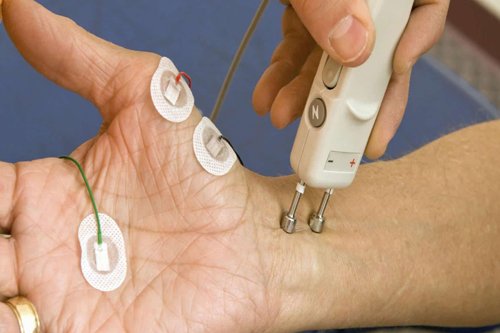Brain and ENT Clinic – Dr Lalit Mahajan In Nagpur & Dr Rachna Gangwani Mahajan In Nagpur
Nerve conduction studies in Rewa

Nerve conduction studies in Rewa play a crucial role in diagnosing and evaluating various neurological conditions.Thus, This non-invasive diagnostic test helps assess the health and functionality of the peripheral nerves, providing valuable insights for healthcare professionals. Let’s delve into what Nerve Conduction Studies entail and how they contribute to neurological care.
Nerve Conduction Studies, often referre to as NCS, are specialize tests design to measure the speed and strength of electrical signals as they travel along the nerves. These studies help identify abnormalities in nerve function, assisting in the diagnosis of a range of neurological disorders.
Diagnosed through Nerve Conduction Studies
Peripheral Neuropathies:
- Thus, Treatment may involve addressing the underlying cause, such as managing diabetes, correcting nutritional deficiencies, or discontinuing medications that may contribute to neuropathy.
- Medications may be prescribe to manage symptoms, including pain, tingling, or numbness.
- Physical therapy can help improve strength, balance, and coordination.
Carpal Tunnel Syndrome:
- once, Conservative treatments may include wrist splints to alleviate pressure on the median nerve, anti-inflammatory medications, and modifying activities that worsen symptoms.
- If conservative measures are ineffective, surgical intervention (carpal tunnel release) may be considered.
Guillain-Barré Syndrome:
- Guillain-Barré Syndrome is a medical emergency, and treatment often involves hospitalization. Intravenous immunoglobulin (IVIG) or plasmapheresis may be use to modulate the immune response.
- Supportive care, including respiratory support, may be necessary in severe cases.
Nerve Compressions and Entrapments:
- Treatment may involve addressing the underlying cause, modifying activities that contribute to nerve compression, and physical therapy.
- In some cases, surgical intervention may be considere to release pressure on the affecte nerve.
Chronic Inflammatory Demyelinating Polyneuropathy (CIDP):
- Treatment often involves immunomodulatory therapies, such as corticosteroids or immunoglobulin infusions, to suppress the abnormal immune response.
- Physical therapy may be recommended to maintain or improve mobility and function.
Why Are Nerve Conduction Studies Conducted?
NCS are commonly performe to:
- Once, Diagnose and monitor peripheral nerve disorders, such as carpal tunnel syndrome.
- Thus, Evaluate nerve damage cause by injuries or conditions like diabetes.
- For instance, Assess the extent of nerve dysfunction in disorders like Guillain-Barré syndrome.
- Therefore, Aid in surgical planning for nerve-relat procedures.
Benefits of Nerve Conduction Studies
- Accuracy in Diagnosis: Firstly. NCS assist in accurately diagnosing and characterizing various neurological conditions.
- Guiding Treatment Plans: Once, The results of NCS help healthcare professionals develop target treatment plans for patients with nerve-relate disorders.
- Monitoring Progress: Thus, NCS may be repeat over time to monitor the progression of nerve disorders and assess the effectiveness of interventions.
